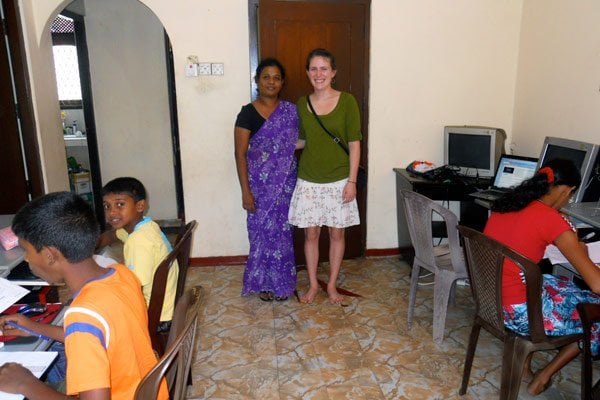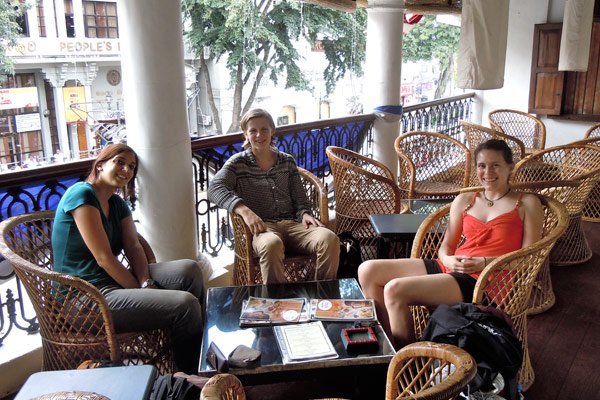Why did you decide to volunteer abroad with Projects Abroad in Sri Lanka?
Carmen: I love to travel, and had already had some experience volunteering with Orphanage Outreach in the Dominican Republic teaching English. A friend of mine did a physical therapy project in Romania with Projects Abroad, and recommended that I check them because she had a great time. I only had 3 weeks off from school for winter break, and Projects Abroad was by the far the best deal I could find for 2-week volunteer projects. I chose to go to Sri Lanka because I had never been to Asia and wanted to really get out of my comfort zone and try something new.

Describe your day-to-day activities as a volunteer.
Carmen: The sound of farm animals woke me up every morning at least an hour before breakfast. I usually spent this time talking on the phone to family members (it was night time in the US!) or reading outside while the heat was still tolerable. I began every day with a pastry for breakfast (on my first morning, my host mother declared that all of her female volunteers liked pastries. Who was I to argue with that statement?). I met another volunteer in the road and we walked 15 minutes to the one-room school where we taught children how to use computers. The road was frequented by motorcycles and mini taxis (“tuk-tuks”), but it was lined with palm trees and much quieter then the noisy, dirty roads of the capital city. The Sri Lankan people walking along this road were always very friendly.
In the mornings we taught a class for high school students. Most had not scored high enough on their A-levels to get into college, so they were learning basic Internet and Microsoft Office skills in order to qualify for secretarial-type jobs. After the morning class we walked back to our houses for a lunch of rice and curry. “Rice and curry” is a deceptively simple name for a huge bowl of spiced rice surrounded by a medley of smaller bowls with different kinds of curry: chicken, fish, potato, cucumber, squash…
After lunch I usually read some more, or just napped in the intense midday heat. We would return to school for our afternoon class of elementary school students. Although our classroom only had 12 computers, many of these students were small enough that they could sit two to a computer and we would usually have 15 or more students at work. They worked on basic typing (quite difficult when you haven’t learned the English alphabet yet) and Internet skills. I frequently went around the room stopping students who were typing with one finger, set up their hands on the keyboard, and went through several lines of typing with them trying to use all 10 fingers. Of course, they reverted to using one finger about five minutes after I left them. I also frequently had to work with students who didn’t completely understand how to use a mouse. I would set up their hand on the mouse, put my hand over theirs, and show them how the mouse moved, clicked, double-clicked, and right-clicked. The young girls were especially excited to see me (a strange white girl) in their classroom and seemed to erupt into giggles whenever I glanced at them.
After the afternoon class, I would go to the gym with other volunteers or meet them at a local café for coffee and cookies. They were from Sweden, Switzerland, England and Australia. After talking about our days or making plans for the weekend, we headed home for dinner, which was usually smaller and simpler (and less spicy!) than lunch. Also, showers! After the intense heat of the day, I welcomed the unheated (read: freezing) shower. After dinner, it was very rare that I went anywhere because women are generally not out alone after dark, but I was usually too tired to notice and fell straight asleep after dinner each night.

How has this experience impacted your future?
Carmen: I am about to graduate from college with a degree in economics, and I hope to go into development economics (AKA studying the differences between developed and developing countries + how we can improve standards of living and access to education, health services, technology, and financial products). I believe that traveling to developing countries frequently is an extremely important part of the field of development economics, because it is important to get to know the people in the places that I want to study. While economic databases can help define the economic realities of life for people in developing countries, it’s still very important to go out and travel and see those databases personified. For example, reading the phrase “You will teach children how to use a mouse” is very different from being in a classroom and being shocked that a child doesn’t know what it means to “click” on something. Traveling also helps me see the cultural differences that are difficult for economists to quantify. And finally, this trip gave me the opportunity to meet some awesome volunteers from all over the world who came to Sri Lanka with a similar purpose, as well as many friendly, caring, and remarkable Sri Lankan people.